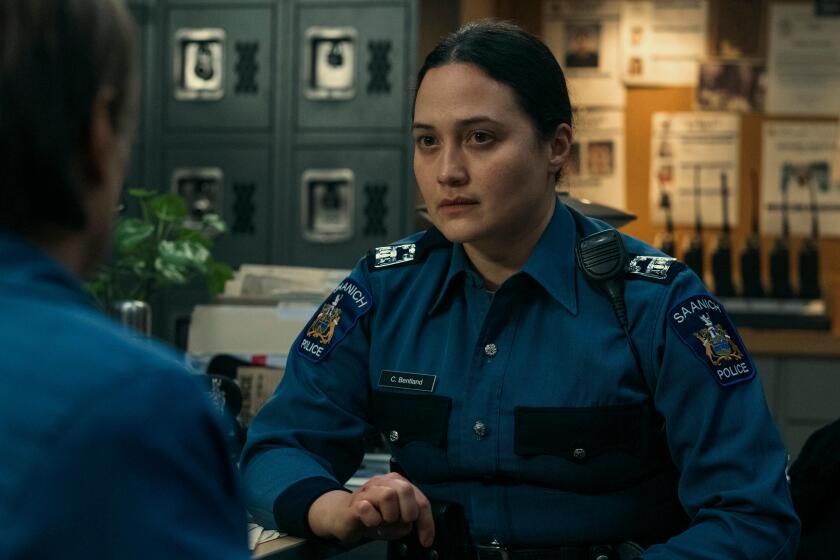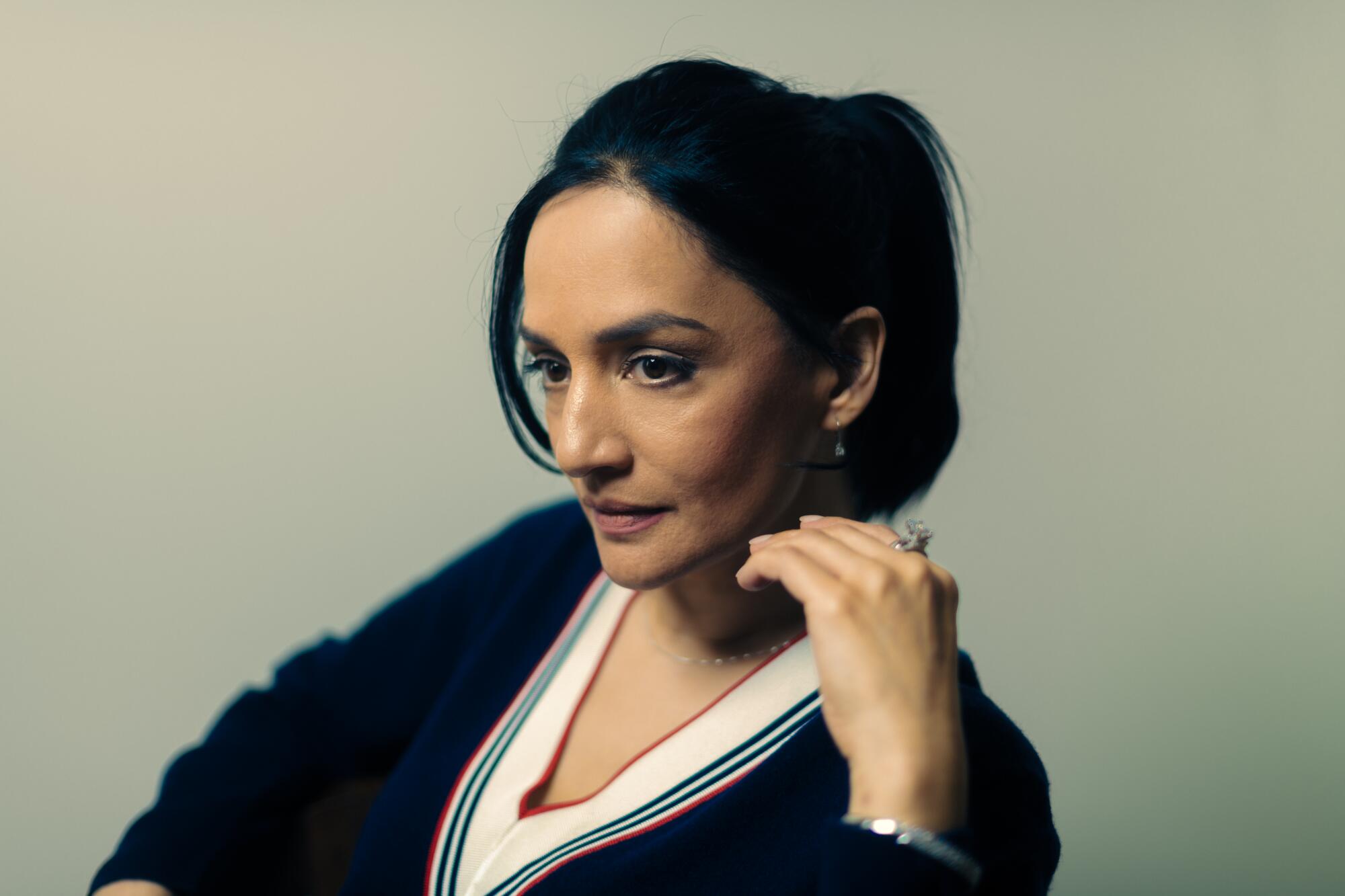
- Share via
“I hadn’t heard of her story, which deeply shocked me because it hit me to the core,” Archie Panjabi says somberly as she reflects on the matter.
It was 1997. Reena Virk was a 14-year-old Canadian girl whose parents were immigrants from India. She painted her nails blue and listened to the Notorious B.I.G., determined to push against the rules of home to fit in. Just a regular teenager. One night, she was lured to a party by a group of her peers before being brutally beaten and killed. Her grisly death drew attention to bullying and peer pressure, particularly among girls, and was deemed a national tragedy in Canada.
The harrowing story receives the true-crime treatment in Hulu’s “Under the Bridge,” which concluded Wednesday. The limited series follows writer Rebecca Godfrey and cop Cam Bentland, played respectively by Riley Keough and Lily Gladstone, who investigate the beating and murder of Virk (Vritika Gupta). Six teenage girls, many of them Virk’s classmates, eventually were convicted on assault charges in the beating, and Kelly Ellard, along with Warren Glowatski, was convicted of her murder.
Developed by Quinn Shephard and Samir Mehta, the series largely gets its shape from the 2005 book of the same name by Godfrey, but it also relies on the memoir “Reena: A Father’s Story,” by Virk’s father, Manjit Virk, to help deepen its portrait of Reena and her family and to move beyond simply a retelling of a horrific murder. As a result, it delves into race and the otherness experienced by a girl who was longing to belong.
Hulu’s ‘Under the Bridge,’ an adaptation of Rebecca Godrey’s true-crime book, stars Lily Gladstone and Riley Keough as a pair investigating the death of a teenage girl.
The story, which jumps around in time, begins with Reena and her quest to fit in with Josephine Bell (Chloe Guidry), a John Gotti-obsessed foster kid, and her posse — Kelly (Izzy G) and Dusty Pace (Aiyana Goodfellow) — that leads to damaging rumors and the night that took a fatal turn.
Panjabi portrays Reena’s mother, Suman, a reserved but resolute woman and member of the Jehovah’s Witness faith who runs a home with rules that exasperate her eldest child. Over the course of the series, Panjabi subtly conveys a mother’s tested patience and, later, the abject pain, devastation and strength of a parent experiencing the ultimate tragedy: the death of a child.
For the record:
2:37 p.m. May 29, 2024An earlier version of this story said Archie Panjabi has one son. She also has a daughter.
“It was a very dark road to be able to access that level of grief,” says Panjabi, who has a son and a daughter. “You look at your own life and you can’t imagine. ... I mean, how do you access that? Suman’s an incredibly strong woman. And the more I workshopped, I realized the very thing that Reena was trying to escape, which is her [mother’s] faith — she’s a devout Jehovah’s Witness — is the very thing that is a guiding light for someone. It didn’t heal her, but it put her onto the path of healing.”
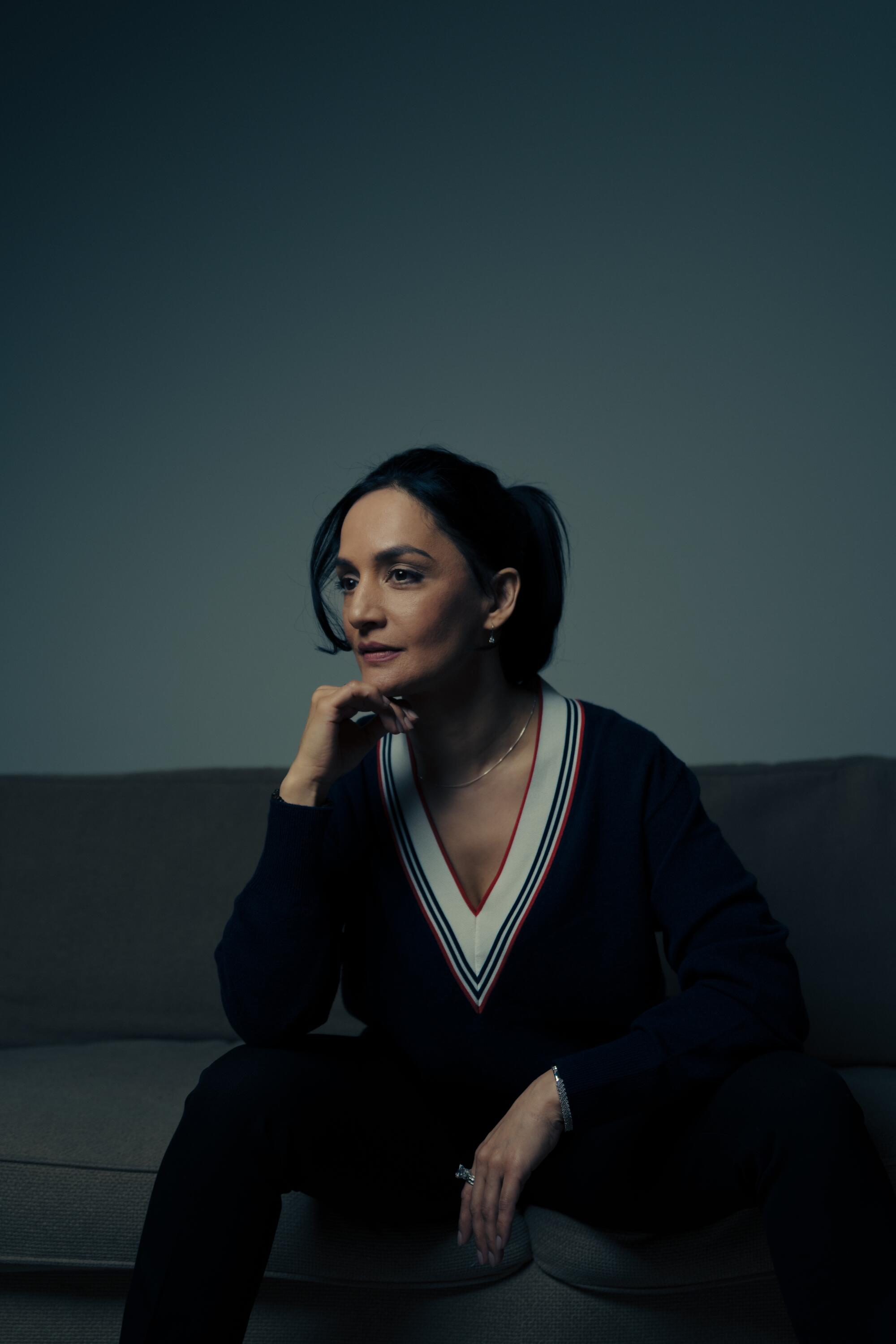
It all leads to a striking and powerful moment in Wednesday’s finale, titled “Mercy Alone,” in which her character confronts one of her daughter’s teenage killers, Warren (Javon “Wanna” Walton), before he stands trial. And she forgives him.
“I still cannot comprehend what she did, what it must have taken her to forgive,” Panjabi says. “Everything inside me, when I had to say those words, I could not control the pain and how hard it was to see the killer in front of me. He looked so helpless. But what he had taken away from her life, it was unbearable. I couldn’t care that it was melodramatic. It felt authentic. It felt very, very raw.”
The series plays with the timeline of events and dramatizes elements of the real story — for example, Gladstone’s character Cam, a Native law enforcement officer, is an invented character— and the scene with Warren is another example of that. In real life, after Glowatski was sentenced to prison, Manjit and Suman Virk went through a restorative justice program, in which victims’ families and offenders meet face to face. The couple extended their forgiveness to Glowatski then, which Godfrey detailed in a 2019 reprint of her book. Mehta says they moved this event because it was a much longer process in real life, but nonetheless, it illustrated Suman Virk’s “radical forgiveness.”
“What happened to Reena was the result of larger systems at play, cycles of violence that actually began before she was even born,” Panjabi says. “To me, the climax of the show really had to be someone coming up with the strength and the courage to shatter that cycle. Suman really felt like the appropriate person to step up in that way. Building the scene was largely about her forgiving him, actually, in advance of his testimony because, on some level, spiritually, emotionally, that felt true.”
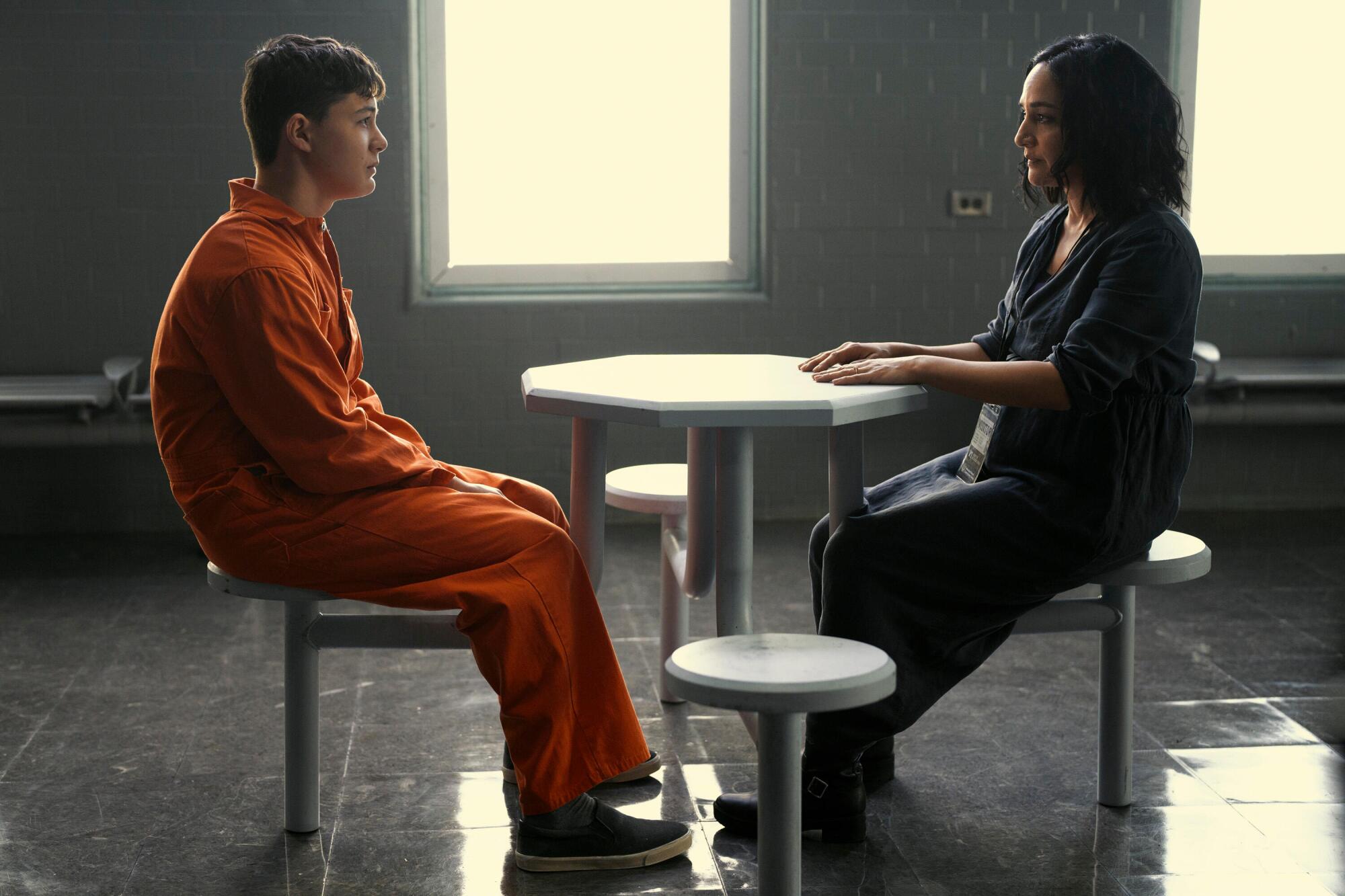
All these months later after production ended, untangling from the emotional weight of portraying Suman Virk has not been easy for Panjabi. The 51-year-old actress is best known for playing mysterious in-house investigator Kalinda Sharma in “The Good Wife” (for which she won an Emmy), and she is familiar with exploring dark and heavy material in series like “I Know This Much is True,” “Snowpiercer” and “Departure.” But the shadow of Reena Virk’s case lingers: “Her story is going to inspire me for the rest of my life,” she says.
She’s video calling from the U.K., where she lives, and it becomes clear Panjabi felt a responsibility in bringing the story to life. She tells a story about how she and the actors who made up the Virk family — Gupta (Reena), Ezra Faroque Khan (Manjit), and Anoop Desai (Reena’s cool uncle, Raj) — are all on a group thread and one day she sent out a message: “OK, should we go to Victoria? I feel like I want to go.” So, they set out on a road trip to the quiet suburbs of Victoria, British Columbia, where the events took place.
“It wasn’t long before we’re in that car and we started bickering — it really felt like a real family because we were arguing about what music to put on, which restaurant to go to,” she says with a laugh. “But we went to the actual spot. We just wanted to go and pay our respects. We took some stuff there that she liked, things like raspberries and some flowers, and read poems (Gupta wrote a poem specific to Reena). We thought the trip would be very dark, that we’d feel sad. But you know, it was filled with joy and peace, and we felt maybe this is a celebration of that life, of that love and the joy that she had.”
In the mid to late 1990s, Panjabi was at the start of her onscreen career. Born in London to Indian immigrant parents, she was trying to make a name for herself with small roles in TV series like “The Knock” and “Dad.” Reena’s experience growing up in that era, before the internet and global travel, felt familiar to Panjabi, who also felt different and faced rejection.
“You create this false self to fit into your peer groups, which is this very modern culture,” Panjabi says. “And then you create this false self to cater to your parents’ needs to try to respect them. You’re constantly struggling in playing these two different selves — I call it a kind of a cultural schizophrenia.”
Panjabi said that Reena is trying so desperately to fit in with this group of girls and to please her parents, at an age where she’s questioning herself and her identity. “Playing the mother helped me understand what my own mother went through,” she said.
And it made Panjabi an alluring and compassionate scene partner, according to 14-year-old Gupta. To hear the soft-spoken young actress tell it, Panjabi went out of her way to make sure her co-star felt comfortable and safe throughout production. It gets Gupta to reflect on scenes, including when her character is caught shaving her legs by Panjabi’s Suman, that were emotionally taxing.
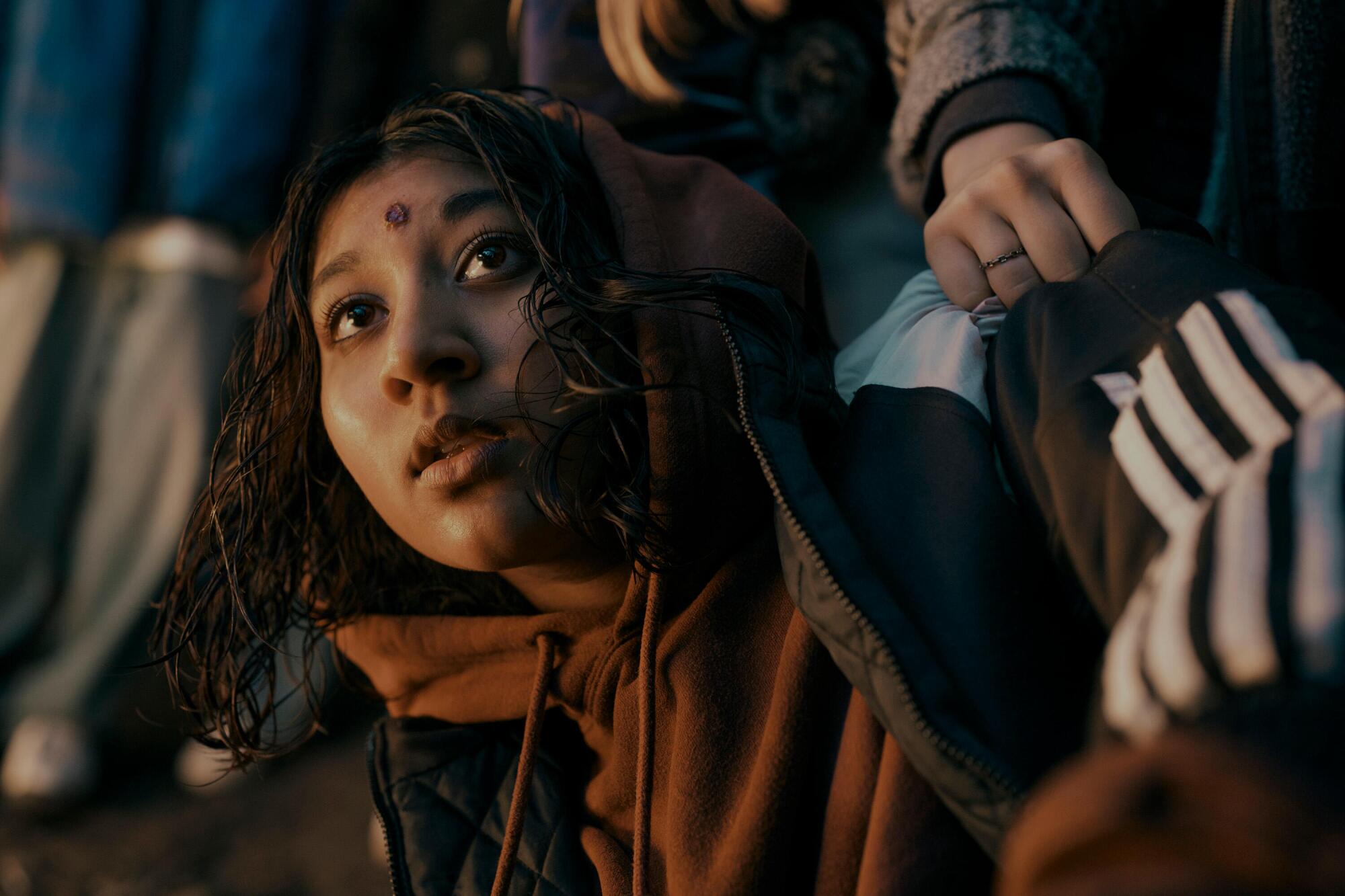
“We shot that so many times,” Gupta says. “Each and every time, Archie would give me a hug after we’d finish each take. And there’s another moment, after the dinner scene when the girls come over, where I start crying in my bed and I realize that Smooch [the family bird] is gone. I remember I had to get into a really dark space in my mental state. And I remember Archie just came and gave me the biggest hug and saying, ‘Everything’s OK. You’re doing such a great job.’ I think those words of affirmation definitely helped me.”
In the aftermath of her daughter’s death, Suman Virk became a tireless anti-bullying advocate. She died in 2018 at age 58. Panjabi considers for a moment if she would have wanted to meet Virk if she was still alive and what she would have wanted out of that experience.
“I think because this is a Suman version, not Suman, so parts of it have been fictionalized, I have to almost remind myself of that,” she says. “I don’t know what I would have said. What do you say? What she has done after her daughter’s death, and poured her grief into becoming an anti-bullying campaigner, is remarkable.”
While Shephard and Mehta met with Manjit, Panjabi was not privy to that encounter. But she did read his book to extract as much as she could for the character. “You don’t see an awful lot of her, but when you do see her, it’s so powerful, that I thought I really had to invest everything — read every book, read everything that’s out there, [and] talk to Quinn to really try to tap into somebody who sadly is no longer alive.”
When asked if she thought “Under the Bridge” is the show Suman would have wanted to be made to tell the story of her daughter, Panjabi takes a moment. And she softly shrugs to express her uncertainty.
“I feel like there’s so many things which I just shut off from and just pull all that, all those questions, into that character; pour everything I can possibly can into that character, to just try to do her justice.”
More to Read
The complete guide to home viewing
Get Screen Gab for everything about the TV shows and streaming movies everyone’s talking about.
You may occasionally receive promotional content from the Los Angeles Times.
